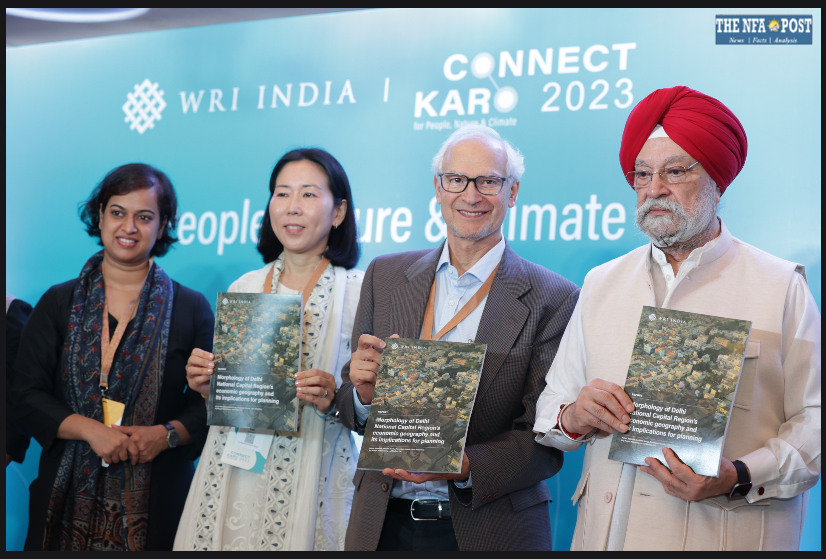New Delhi, NFAPost: Union Minister of Petroleum & Natural Gas, and Housing & Urban Affairs Hardeep Singh Puri launched WRI India’s report Morphology of Delhi-National Capital Region’s Economic Geography and Implications for Planning, on the second day of Connect Karo 2023.
Delivering the keynote address at the opening plenary, Transformational Urbanization for India @ 2047, Union Minister of Petroleum & Natural Gas, and Housing & Urban Affairs Hardeep Singh Puri said the government wants to see India achieve the status of a developed nation by 2047, and for that to happen, there is a need to accelerate the infrastructural development
“In the run up to 2047, aiming at a transformative change will entail making the right choices to accelerate innovation, finance strategic infrastructure, plan for economic development, build resilience and achieve high human development indicators for all. Green Transition will be disruptive but brings opportunities,” said Union Minister of Petroleum & Natural Gas, and Housing & Urban Affairs Hardeep Singh Puri.
As an example of transformation change,Union Minister of Petroleum & Natural Gas, and Housing & Urban Affairs Hardeep Singh Puri highlighted the need for efficient public transport system to achieve holistic urbanization.
“Today we have 860 km of metro lines operational and about 917 under construction – soon, we are going to be the world’s second largest metro network. We must be proud of our metro system, but also need to do a lot more towards urban transport. When we can move people around efficiently and by giving them the ability to choose, we will achieve transformational change in transport,” Union Minister of Petroleum & Natural Gas, and Housing & Urban Affairs Hardeep Singh Puri.
His vision resonated the report he launched, Morphology of Delhi-National Capital Region’s Economic Geography and its Implications for Planning, which analyzes the trajectory of Delhi National Capital Region (NCR)’s economic and spatial transition post liberalization and its transformation within its subregions to become India’s leading economic hub.
The report highlights the need for regional economic development strategies and spatial-economic assessment frameworks for Delhi National Capital Territory. It highlights targeted strategies for the marginalized communities to ensure their security and recognize their contribution to the economy.
Connect Karo 2023 is WRI India’s flagship event that focuses on exploring innovative solutions for critical environmental and sustainability challenges, bringing together experts, policymakers, government officials and researchers from India and overseas to deliberate on the climate action, food security, energy and developmental challenges facing India.
Speaking about the significance of the event, World Resources Institute Ross Center for Cities Global Communications and Engagement Director Tini Tran said cities applying an innovative approach to addressing critical urban problems can have life changing impacts on people’s mindsets and behaviors.
A mid-day plenary session featuring NITI Aayog CEO BVR Subrahmanyam in conversation with WRI India CEO Madhav Pai focused on India’s sustainable development strategies.
“India has taken ambitious initiatives in the area of climate and green transition. Green transition is going to be extremely disruptive as it will ensue drastic shifts across industries and businesses. But simultaneously, it will pave way for new opportunities if we prepare ourselves for it,” said NITI Aayog CEO BVR Subrahmanyam.
Some interesting sessions at Connect Karo 2023:
A panel on Sub-national Climate Action to Support India’s Climate Goals brought together experts to discuss the ongoing climate actions being taken by sub-national governments in states and cities along with understanding the challenges, and the need for enabling provisions on financing, governance and peer learnings to strengthen India’s climate ambitions.
Setting Up for Success: Building India’s Carbon Market Leadership addressed the opportunities and enablers for India in establishing its own carbon market and leveraging the evolving international markets landscape. The session also marked the release of WRI’s report on practical recommendations for an effective carbon market in India, based on extensive research and stakeholder engagement.
Inspiring and Enabling Action on Reducing Food Loss and Food Waste in India, focused on addressing food and nutrition security while enabling cross-learning on the best practices and collaborative strategies.
Energy for Achieving Equitable Health Outcomes highlighted the role of reliable electricity access for better provisioning of healthcare services in rural India. Drawing examples from ongoing research in six states, the speakers discussed how decentralized renewable energy solutions can support healthcare electrification.
Key Initiative launches:
Clean Air Accelerator, a programme aimed to reduce pollution while addressing the challenges in the process, such as limited capacity and funding, and promote data-driven planning, project implementation, and scale-up of air quality improvement actions, was launched in collaboration with Bloomberg Philanthropies, Open Philanthropy and Clean Air Fund.
The second edition of TheCityFix Labs: Accelerating Nature-based Solutions (NbS) was launched with a focus on water, air and green space management in the NCR. Government representatives from Kochi, Mumbai and NCR shared their NbS experiences, including impact, challenges and lessons learned to meet climate resilience goals. The initiative was launched in partnership with Caterpillar Foundation, Department for Environment Food and Rural Affairs.
WRI India CEO Madhav Pai said the launch of Clean Air Accelerator and TheCityFix Labs, further exemplifies our commitment to finding innovative solutions.
“These initiatives, in collaboration with esteemed partners, aim to tackle pollution, promote data-driven planning, and accelerate nature-based solutions for water, air and green space management. We are confident that these initiatives will create a lasting impact and contribute towards building resilient and livable cities,” WRI India CEO Madhav Pai.
Media Contact
About WRI India:
WRI India, an independent charity legally registered as the India Resources Trust, provides objective information and practical proposals to foster environmentally sound and socially equitable development. WRI India’s work focuses on building sustainable and liveable cities and working towards a low carbon economy. Through research, analysis, and recommendations, WRI India puts ideas into action to build transformative solutions to protect the earth, promote livelihoods, and enhance human well-being. WRI India is inspired by and associated with World Resources Institute (WRI), a global research organisation.





